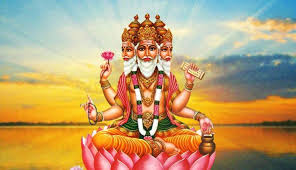
Spontaneity of Creation
Spontaneity of Creation
Posted by gurukripa
(The following write up is inspired by teachings of Swami Parthasarathy)
Mundaka Upanishad chapter 1 section 1 mantra 7 explains the spontaneity of creation of universe from Brahman with the help of 3 powerful similes.
“As the spider makes and withdraws (its web), as on earth herbs grow, as from a living man hair grows on head and body – so from the Imperishable the universe emerges here.”
First Simile: Spider spinning web
When spider spins the web, it does not bring any material external to itself. The web is spun out of its own saliva. The spider sits as the master of the web without getting caught in it. The spider swallows the web and moves on once the game is over. There is no change in spider either after the web is spun or after the web is swallowed.
Similarly Brahman, the supreme Imperishable Reality, is both the material cause and efficient cause of this universe. Brahman spins the universe out of Himself as it were. He sits as the Lord of universe without getting caught in the affairs of the universe. Once the leela (game) is over, Brahman withdraws the universe, as it were, into Himself. Brahman remains changeless even as the universe is created, sustained and destroyed.
Though there are several points of comparison in this simile as mentioned above, one drawback is the comparison of motive of creation. The spider spins the web with a motive to trap insects while Brahman is free from any motive. But how do we understand a creation without motive? The second simile of the mantra comes in handy to understand that.
Second Simile: Herbs growing from Earth
Earth produces vegetation spontaneously. We can even stretch the example to accommodate that eventually vegetation goes back to earth after life. There is no effort on the part of earth in this process. And earth remains the same before and after. Importantly, earth has no personal motives in bringing out any vegetation.
Similarly Brahman effortlessly brings forth and withdraws the universe without any motive whatsoever. If we attribute motive to God then we reduce His status to that of a watch-maker or a shoe-maker.
However the incomparable aspect in this simile is that while earth is a dead matter, the plants that it brings forth have lives in them. But in the case of Brahman and universe it is just the opposite. Brahman is the life-principle while universe is dead matter without the support of Brahman. The third simile rectifies this drawback.
Third Simile: Hair growing on Man’s Body
Growth of hair on man’s head and body is also spontaneous and without any effort. There is no motive in this case also. Importantly, the source of hair is a living man while the hair is a dead matter.
Similarly, the source of creation, Brahman, is Pure Consciousness, the life-principle or the Spirit. The universe that emerges out of Brahman is matter and inert per se. Universe requires the support of Brahman. But this simile cannot accommodate the comparison of created universe folding back into Brahman i.e. hair does not merge back into man’s body. So go back to simile one – spider spinning the web.
Conclusion
Creation of universe is beyond human intellect to comprehend. Upanishads and great masters can quench the thirst of an earnest seeker up to a point by giving metaphors and similes. Finally he is encouraged to evolve into a higher plane of consciousness where he understands the truth of (non) creation for himself. It is at that point he realizes that his erstwhile experience of universe was a mere illusory phenomenon like a dream which can never be captured within the test tube of human intellect.
Namah Parama Rishibhyo Namah Parama Rishibhyah
